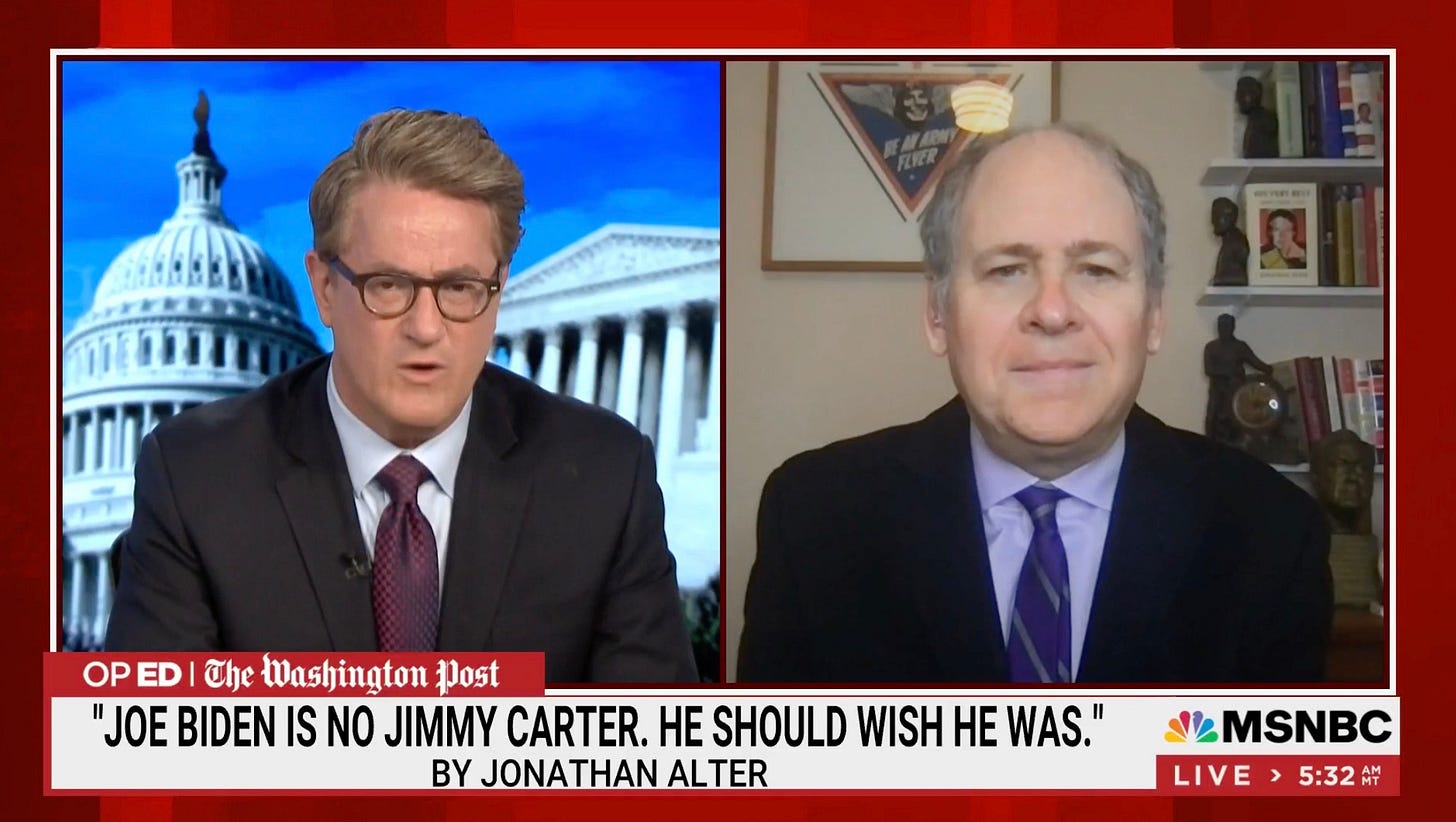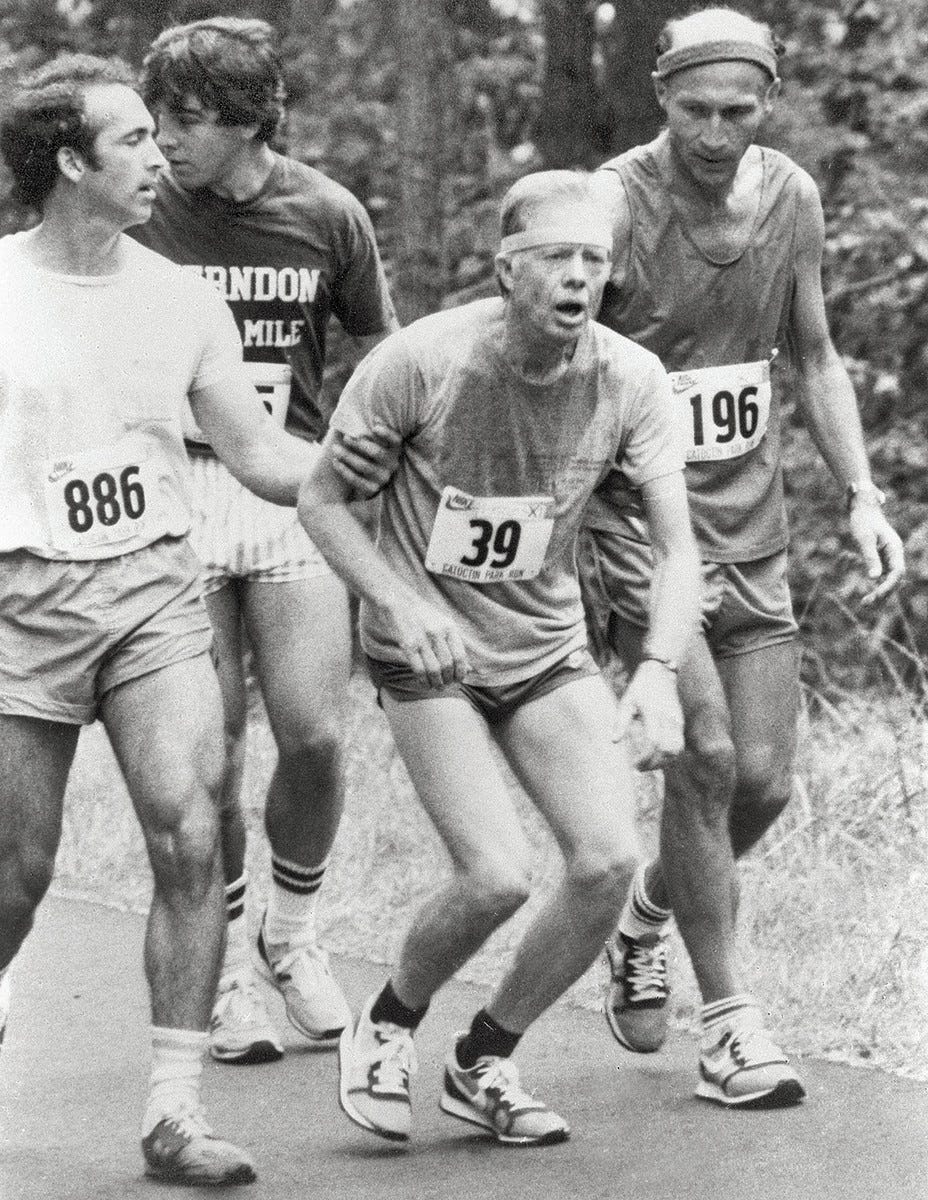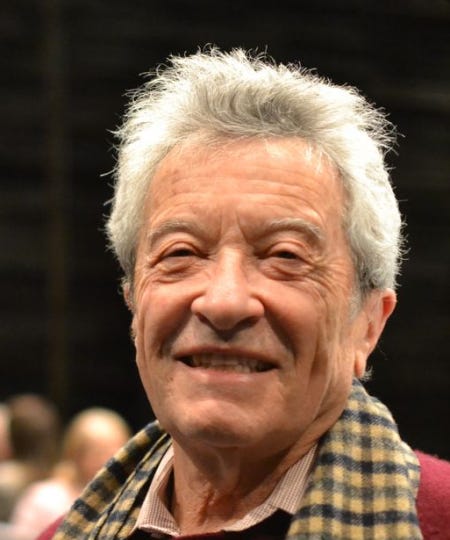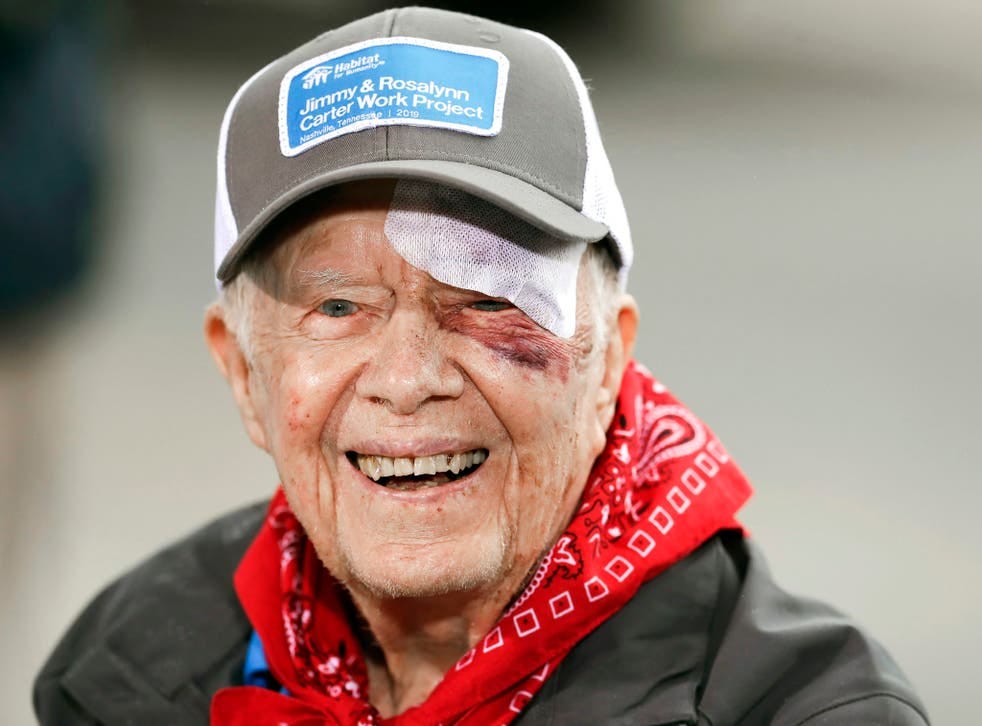Ruminating with JERRY RAFSHOON
One of Jimmy Carter's top aides on all the comparisons to Joe Biden
When The Washington Post asked me to write a piece comparing Joe Biden to Jimmy Carter, I was skeptical at first. As Carter’s biographer and a longtime Biden watcher, I didn’t want to be inadvertently enlisted in what seemed like an obvious effort to malign both men. But the circumstances facing the two presidents—inflation, tensions with Iran and Russia, anemic polls— are similar enough that I decided to accept the assignment. The article was published in Sunday’s paper (I’m still old-fashioned enough to consider the print version the definitive one) and it kicked off a conversation I’d like to continue with all of you.
So I’m now annotating excerpts of the article a bit and getting help on the comparison from Jerry Rafshoon, who made all of Carter’s ads starting in his 1966 campaign for governor, served as White House Communications Director, and was a great source for my book—always good for a joke or funny line, with a sharp memory for long-ago details. He is now my good friend and business partner in a Carter-related television project I don’t want to jinx by discussing further.
As you’ll see, Jerry rejects the premise of the comparison. We also discuss the Carters’ reaction to my book, Jimmy’s steamy love letters from the navy, and how Biden should re-tool, among other subjects.
Annotating My Washington Post Story
When I was trying to figure out my lede, I recalled a funny and profane story I heard many years ago that involved Mario Cuomo, a big Carter supporter. Jerry was good enough to confirm it for me.
Jimmy Carter must be the sexiest man in the country,” Mario Cuomo, lieutenant governor of New York, joked privately to friends in 1979. “Everywhere I go, people say, ‘F--- Carter.’”
“Let’s go Brandon” is today’s more public version of that refrain, routinely turning up on T-shirts, at Republican rallies and even during a Christmas Eve call-in event with President Biden and first lady Jill Biden.
I chose an olfactory metaphor in my third paragraph:
The danger for Democrats is that the bad odor surrounding Carter’s presidency — the smell of failure that led fellow Democrats Bill Clinton and Barack Obama to marginalize him at four Democratic conventions — has begun to waft onto Biden, who was the first senator to endorse the former peanut farmer’s candidacy in 1976.
Just a few days later, I have mixed feelings about the metaphor, thanks to a line about Carter that Rick Hertzberg borrowed from George Orwell. Rick, arguably the greatest New Yorker political writer in the history of that magazine (he and Richard Rovere are in a class by themselves), served as Carter’s chief speechwriter. I was a summer intern in the White House speechwriting office in 1978 and sat right outside Rick’s door. He and I have been friends since.
Rick compared Carter to Mahatma Gandhi, another peacemaker whose saintliness could be grating to some of his followers. After Gandhi was assassinated in 1949, Orwell wrote a dry-eyed assessment of him that ended with the line: “How clean a smell he has managed to leave behind.” That—not Carter’s political failures—is what he should be remembered for.
Jerry Rafshoon felt the whole premise of my article was out-of-date. “I don’t think calling Biden ‘another Jimmy Carter’ is an insult because most people don't know what you're talking about. They're not old enough to remember the Carter presidency or, if they are over 60, they remember little about it.” To me, this sounds like wishful thinking on Jerry’s part.
Jerry, who tried (and often failed) to reign in Carter’s pollster, Pat Caddell, continued: “If you took a poll about revered presidents and ex-presidents, he'd be very high up. So I don't see this new generation hearing any of it or it hurting Biden or Carter.”
That may be the case but I still found the comparison intriguing:
Both Carter and Biden inherited sour national moods: Carter faced a widespread sense of ennui and decline laced with fear; at least for now, Biden has it worse, with an angry and divided country exhausted by the pandemic and witnessing the Trump-dominated Republican Party’s assault on democracy.
When I was a Harvard undergraduate, I took a terrific class at the Kennedy School of Government taught by two legendary professors, Richard E. Neustadt and Ernest May. The course was called “The Uses and Misuses of History” and I learned a lot about the latter—the way Thinking in Time could lead you astray if it was not done carefully. The course and book had a big influence on me.
Beyond the normal hazards of misusing history, there are two major problems with the Carter-Biden analogy. Carter — stubborn and prickly with a high IQ — was the quintessential outsider, arriving in Washington with no national experience and little interest in making new friends. Biden — warm and accommodating with high emotional intelligence — is the classic insider, and it has helped him achieve a surprising level of party discipline, Joe Manchin and Kyrsten Sinema notwithstanding. This stands in sharp contrast to Carter’s chilly relations with many other Democrats, especially Ted Kennedy, whose 1980 challenge for the party’s presidential nomination hurt Carter badly.
The second major problem with the analogy is that it’s based on an apples-and-oranges comparison between Biden’s first year and Carter’s fourth.
This is a frequent problem. When analogizing, timing is everything. After noting how much worse the economy was in 1980 (15 percent inflation; interest rates as high as 21 percent), I explained the reasons why we probably won’t repeat history—that we’re not facing an OPEC stranglehold, automatic cost-of-living adjustments and other elements of structural inflation. Moreover, the political context is very different.
Biden is unlikely to experience either Carter’s highs or lows in the polls. And the historical odds suggest that he probably won’t face the array of debilitating challenges that beset Carter in the months before he was trounced by Ronald Reagan in the 1980 election.
But I may have been hasty when I wrote that last week. While Biden could easily recover, it’s also entirely possible that, like Carter, he will face “an array of debilitating challenges” —if not this year, then perhaps in 2023 or 2024. As all presidents learn, shit happens. Biden is less popular at the end of his first year than every other president since the dawn of polling except Trump. Even if he doesn’t go down further, Biden could—like Trump—be mired in the mid-40s for the rest of his term. Or not.
Biden showed impressive stamina at his long press conference on Wednesday, but he seemed old and it’s becoming increasingly hard to imagine him remaining president until he’s 86. In the meantime, The popularity of the president should not always be the top story in Washington. In Biden’s case —and Carter’s —the press needs to do a better job of separating long-term accomplishments from short-term political assessments. The Post recognized this and let me explain why Carter was a better president than people knew at the time.
The easy shorthand on Carter — bad president, great ex-president — is misleading. His record in office has been consistently underrated and his achievements in the years since, while inspiring, are slightly overrated. For all his impressive humanitarian work fighting disease, championing democracy and building houses for the poor into his nineties, he simply didn’t have the power to accomplish as much after leaving the presidency as he did in office.
The list of unheralded presidential accomplishments is long. Carter doubled the size of the national park system and brought the first true diversity to the federal government, including the appointment of five times as many female judges as all his predecessors combined. He signed major ethics bills and civil service reform, as well as airline and trucking deregulation that boosted productivity, and established two new Cabinet departments, Energy and Education. First lady Rosalynn Carter spearheaded efforts — now being reversed in some states — that led to all 50 states requiring school-age children to be vaccinated against contagious diseases.
In foreign affairs, Carter brought Israel and Egypt together at Camp David to forge the most durable peace treaty of the postwar era; normalized relations with China, which became the foundation of the global economy.
On Morning Joe on Monday, Joe rightly made a big deal about that one.

I was surprised to learn in my book research that of all the things Carter did as president, Carter himself thinks China is what he’ll be most remembered for. But there was a lot else.
[He] won ratification of the Panama Canal treaties, which prevented a major war in Central America; and established the world’s first true (if sometimes hypocritical) human rights policy, which even Republicans agreed helped end the Cold War, helping to spur a democratic revolution around the world that is only now being rolled back.
In retrospect, Carter’s presidency proved to be ahead of its time, especially on the environment (and not just because he put solar panels on the roof of the White House, which Reagan eventually took down). Carter signed 15 major pieces of environmental legislation, including the first comprehensive energy policy, the first green energy bill and the first toxic waste cleanup. Had he been reelected, he planned to begin addressing a little-known issue called “carbon pollution” — a painful “what if” of human history.
Oops, I forgot curbing redlining, which Carter accomplished by signing the Community Reinvestment Act of 1977, among dozens of other unheralded achievements ranging from discouraging the Soviet Union from invading Poland and pardoning draft dodgers to rescuing Social Security and legalizing craft breweries.
Instead of yakking with Jerry about policy (he’s more of a political guy), I thought I’d ask a question that I get all the time:
JON:
People are understandably always concerned about Carter’s health. He has fallen and been hospitalized three times in the last two years. But when I check with my friend in Plains, she says that of course anything can happen any time but both of them are doing well.
JERRY RAFSHOON
Not a day goes by that I don't get a call from somebody saying they heard a report that there was an ambulance coming from Americus [the closest small city to Plains] and wondering, Is it for Carter? I say I don't know.
But I do know that he stuck his head out his door one day and walked around the porch and neighborhood and said, “Now, look: If anything happens, there’s gonna be a lot of press here. Clean this place up!” That’s Jimmy.
JON:
When you and I saw him last summer in Plains at the Carters’ 75th wedding anniversary, he looked bad because he had just fallen and had a concussion a few days earlier. But he rallied, as he did when the Bidens came to Plains last May.
JERRY RAFSHOON:
They stayed an hour and then when they came out, Rosalynn was with them and faced the national press that was following [Biden] on the trip. And I looked at it on TV and said, “Oh, God, what did he do? Why isn't he in this? Why isn't he there?”
So when they left I called Jill Stuckey [who runs the the Carter site for National Park Service] and she said, “Well, the hour was up, and they were getting ready to go and Jimmy said, ‘Oh, I have a swimming lesson at 3:30. Y’all go on out and I’ll go out the back door and go to the swimming pool.’” And then I got to thinking that he knew exactly what he was doing. He knew that if he went out there, there would be questions and he would be asked by the national press corps about where he agreed and disagreed with [Biden] on this and that. He probably said to himself, “I've had enough of all that. I'm gonna swim.”
JON:
After he lost some vision in 2019 and had to stop all emailing, I haven’t had much contact with him. Have you?
JERRY RAFSHOON:
Last time we talked, he said your book didn’t have enough about his post-presidency.
JON:
I fear I put that in his head by apologizing for that in my inscription.I had to cut 100,000 words before the publisher would publish it and decided to focus more on his underrated presidency, though the later years still get a lot of attention.
JERRY RAFSHOON:
You were pretty hard on him for that 1970 campaign for Governor.
JON:
He deserved it. He never said anything explicitly racist but that campaign had plenty of dog whistles.
JERRY RAFSHOON:
The biggest question that the Carters had about your book was Rosalynn’s concern about you putting the love letters [Jimmy wrote her from the navy] in there.
JON:
She might have also been upset that I have these letters he wrote to another woman in 1945, when he just missed being one of those sailors in Times Square on V-J Day. On Jimmy’s love letters to Rosalynn, it’s not like I blindsided them. I knew they were the most explicit love letters we’ve ever seen written by a future president. So when she let me see them—letters no one outside the family had ever seen—I agreed to show her those pages before publication. Same with the fascinating excerpts from her unpublished diaries during Camp David and the hostage crisis. I figured it was only fair to show her the context.
I prefer another of Rosalynn’s reactions, conveyed to me after she said she liked Judy Woodruff’s interview with me on the NewsHour: “Jonathan had some critical things to say about Jimmy in his book but he only said nice things about me.”
That’s basically true. She’s an enormously formidable person and there’s not a lot to criticize. They couldn’t have been that upset or they wouldn’t have invited me and Emily to their anniversary party.
JERRY RAFSHOON:
That’s right.
JON:
I think that’s because I reassessed the presidency in a more positive light in my book, and do so again in this article.
But I also raise a potentially disastrous similarity between Carter and Biden:
The danger for Biden is that he may follow Carter’s pattern of receiving little credit for his achievements, which already include record job creation, a huge and rapid vaccination campaign, and a long-sought bipartisan infrastructure bill, with the voting rights bills all but dead and his Build Back Better package hanging fire. It’s easy to forget that Biden won an astonishing $3 trillion in public investment in 2021, dwarfing in constant dollars anything Franklin D. Roosevelt and Lyndon B. Johnson did in their first year.
Voters seem to have pocketed these victories. Both Carter and Biden suffer from what political scientist Brendan Nyhan has called the “Green Lantern Theory,” in which Democratic presidents are expected by the press and public to have the powers of a superhero in bending Congress to their will — and are seen as failures when they cannot do so every time.
JON:
What should Biden do differently in communication?
JERRY RAFSHOON:
Stop trying to prove you’re the unTrump. He’s pivoting to that, especially with his January 6 speech, but he needs to do it more and better.
JON:
Get tougher, a little more like Harry Truman?
JERRY RAFSHOON:
Yeah, and brag. Do what we didn’t do until the last two years when we had a crisis. By the time I came in [1978], Jody [Powell, Carter’s well-regarded press secretary] had to put his finger in the dike every day.
JON:
What do you think you did that everybody has forgotten about since Carter lost—stuff that was smart and worked?
JERRY RAFSHOON:
Well, you have to go back to the fact that we didn't have 24-hour cable news. So it was a very different media environment. What we did was to try to highlight the human aspect of Jimmy Carter. And some people used to complain to me about the blue jeans [he wore] and the running [Carter was a jogger] and asked, What does all that do for us? I said, “We're not trying to impress ‘us.’ We’re trying to impress the folks back home.”
JON:
The running kind of backfired when he collapsed in that road race near Camp David.

JERRY RAFSHOON:
It was on the front page of every paper. When he said he was going to run a marathon, Jody said, “OK, but you better win.”
JON:
He was running against people who’d been in the Olympics, so that wasn’t smart. I agree with your basic point. Our son [Tommy Alter, a producer and podcast host] is really saavy about optics and he can’t understand why Biden doesn’t go to playoff games or otherwise show that he’s part of normal American life.
While that’s all important, it’s not what he’ll be ultimately judged for. Journalists focus on the political standing of the president, which means covering trivial stuff like collapsing in the road race or being attacked by a killer rabbit in Carter’s case, and whether he mangles his words and goes back to Delaware too much in Biden’s. Historians, by contrast, need to look at how a president changed the country and the world. I try to do some of both.
As long as I had Jerry, I wanted to ask him something I had never asked him before.
JON:
Since 1952, when Admiral Rickover asked him in his interview if he’d always done his best at Annapolis, and he had to say no, Carter uses every minute of every day. Have you ever seen him just goof off and go on what they used to call “Miller Time”?
JERRY RAFSHOON:
Not really.
JON:
Thanks, Jerry.







Love this one so much Jon. The breadth and depth of what you think about is so impressive!